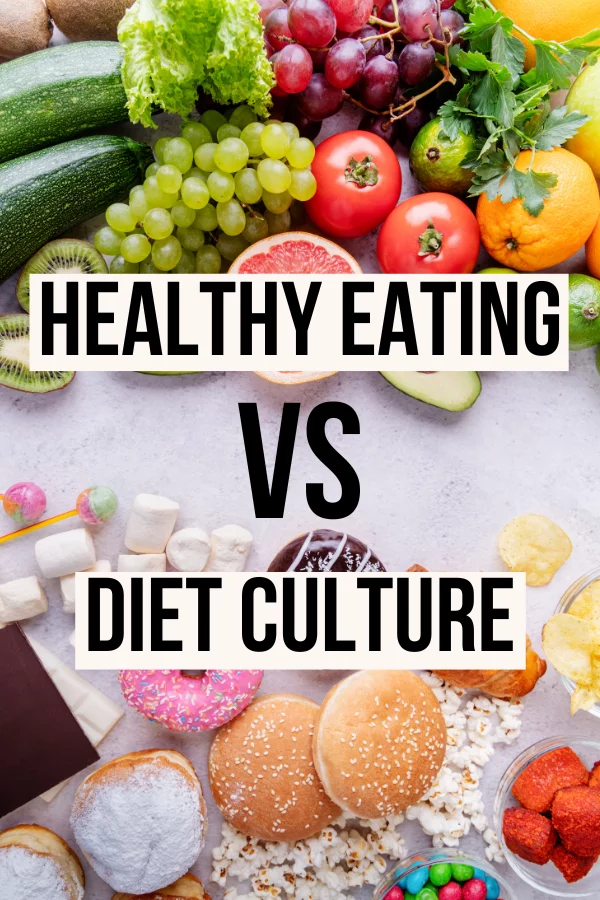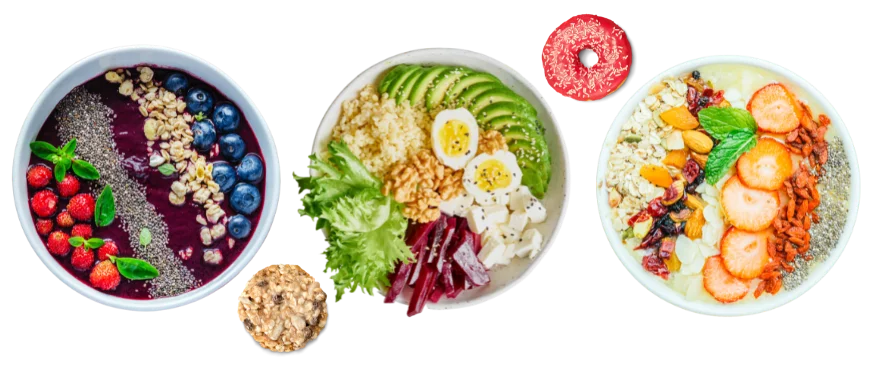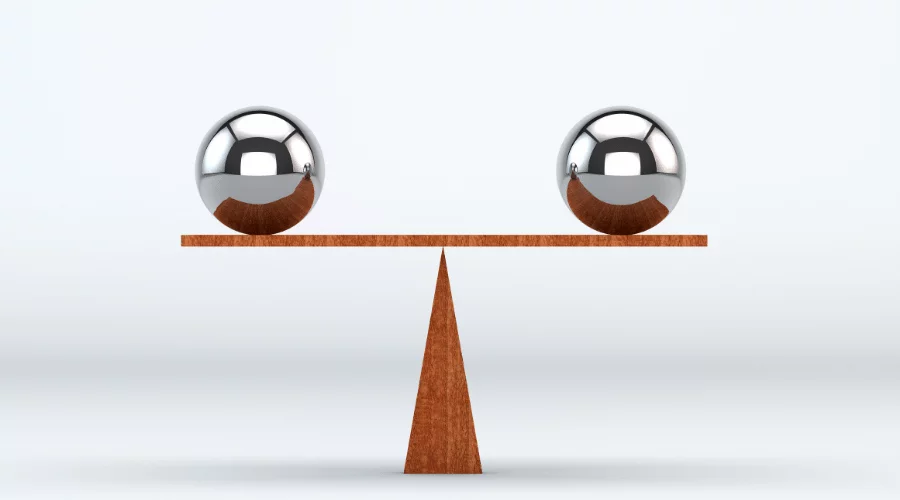Written by Lucie Villeneuve, nutritionist, M.Sc.
It can be hard to find the right balance between healthy eating and dieting and trying not to become obsessed with food. Prioritizing healthy nutrition is important for optimal well-being, but so is moving away from diet culture and working on a healthy relationship with food.
In this article, I’ll talk about how you can find the perfect middle-ground for you and learn to build a healthy mindset around food.

What is an unhealthy mindset around food?
You have an unhealthy mindset with food when you are ingrained in diet culture and desire to be thin above all else, even if it means being unhealthy. This can manifest in things like:
- Being obsessed with food. You become consumed with thinking about food, planning your meals, checking nutrition labels, counting calories, tracking macros…
- Food guilt. You feel guilt or shame whenever you eat a food that you have deemed as bad, and feel like you have to compensate by eating extremely “clean”. You label yourself as a weak person with no willpower who can’t stick to their diet.
- Restricting followed by binging. You feel like certain foods should be off-limits and that you shouldn’t go over a certain amount of calories, so you restrict. This is not sustainable and therefore leads to binging, leaving you frustrated and ready to go on another loop of the cycle.
- The all-or-nothing mentality. You want to eat completely perfectly, no exceptions. You believe that having one “bad” food, like a cookie, is going to ruin your entire diet, so you decide to have the entire box while you’re at it. (Which is obviously much worse for your diet.)
- Orthorexia. You want to eat only “clean” food, no junk food, obsess over calories and macros, and justify doing all of these things because you find them healthy.
If you find yourself doing any of these things, here are some tips to change this mindset and find the right balance again.
How to find the balance between healthy eating and dieting
Stop viewing foods as good or bad
While certain foods are undeniably healthier than others, all foods can be good choices depending on the circumstance. An apple can be a good choice when you want a quick, on-the-go fresh snack in between classes to bring you energy.
But if you’re coming home from a long day at work and are craving something emotionally comforting, having a few scoops of your favorite ice cream will be the better choice. It’s absolutely fine to know that certain foods will bring you more health benefits than others, like vitamins, fiber, or anti-oxidants, but that doesn’t mean that other foods aren’t beneficial in other ways.
So next time you catch yourself thinking negative thoughts about a food and telling yourself you shouldn’t be having it, try reframing things in a more positive light. Should you be eating mainly healthy whole foods? Yes. Is there room for some more processed treat foods once in a while? Absolutely.

Practice mindful eating
If you’re able to practice mindful eating, it will definitely help you find the right balance with healthy eating without falling into restriction. When you eat mindfully, you learn to eat foods that really fuel you in the correct way, foods that honor your body, your health, and your cravings.
It will also help you focus on the present moment when eating as well as be more in tune with your hunger cues, which are all very helpful things as well. Check out my article on the benefits of mindful eating here!
Don’t create anti-diet food rules
When you start breaking your food rules, you may feel like anything related to healthy eating is diet culture. For instance, you may find it hard to eat a salad, even if that’s what you actually want, because you’re scared that it might be the remnant of a diet rule.
But we definitely aren’t trying to break rules in order to make more rules. You always need to put your needs and cravings first. There’s a difference between diet rules (ex: I ate too much lunch so I’m going to skip dinner) and listening to your body’s signals (ex: I ate too much lunch so I’m craving a lighter dinner).

Focus on what to add instead of taking away
You shouldn’t be focusing your efforts on taking away foods that you have deemed as bad from your diet. It’s better to think about all the healthy, nutrient-dense foods that you can add to your diet instead:
- Whole grains such as brown rice, whole-wheat pasta, oatmeal, buckwheat, bulgur, quinoa…
- Fruit and vegetables
- Beans and legumes
- Nuts and seeds
Eating more of these foods will naturally leave less room for the more processed, less nutrient-dense rest, and your mindset will be focused on adding, not subtracting.
Stop restricting your food intake
You can’t be building a healthy relationship with food if you’re restricting everything that you’re eating. This doesn’t mean that you should eat compulsively or listen to every single craving.
But it does mean that you need to regularly incorporate all the foods that you enjoy into your meals, even if they seem “off-limits” to you. Indeed, the more you restrict foods, the greater your cravings for them will be. By eating all the foods you love in moderation, you’ll avoid frustration, intense cravings, and binges.

Practice gentle nutrition
Gentle nutrition is the 10th principle of intuitive eating and really enables you to find the right balance between what your body wants and also what you need in terms of healthy nutrition. It means being able to honor your cravings but doing so in a thoughtful, moderate way, and incorporating foods that make you feel good both physically and emotionally.
A gentle nutrition approach will encourage adding a lot of whole, healthy foods to your meals along with more fun foods to keep the meal satisfaction high. When you have the right intentions and mindset, it can be beneficial to set a few guidelines for yourself, like increasing your intake of green veggies or eating legumes 3 times a week. But if you’re rooted in diet culture, these will just end up being diet rules that do more harm than good.
This is why finding the right balance is so crucial!

In short
In order to find the balance between healthy eating and dieting, you need to stop restriction and viewing foods as good or bad, make sure you’re not creating anti-diet food rules, focus on adding plenty of whole, healthy foods to your diet, and practice gentle nutrition as much as possible.
-Lucie

